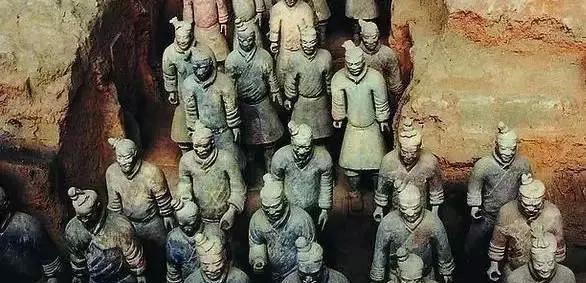Although the divine turtle is still alive, the princely ants have become dust after all, and no matter how great the emperor in ancient Chinese history is, he will eventually die. Even an emperor like Qin Shi Huang, who had been obsessed with seeking the art of immortality all his life, did not delay in building his own Qin Shi Huang Mausoleum, and the construction of the imperial tomb was definitely a top priority in the eyes of successive emperors. And today the ancient occupation that Pi Sauce is going to introduce to you is inseparable from the mausoleum.

After all, it is a job to deal with the dead, so this job has a lot of taboos, such as not going out during the day, not allowing a fire to eat, but there are still a bunch of people who want to come with their heads broken, this job is the tomb keeper! Many people feel confused, this is a broken job, this can not go that can not go to a bunch of restrictions, at night is still quite afraid.
First of all, the economic basis of ancient China and even modern times is the small peasant economy, male cultivators and female weavers, even if they do not go to the tomb to go home to cultivate the land, it is also the same acre and three points of land. In ancient times, peasants cultivated land entirely by relying on the sky to eat, and in the event of disaster years, taxes were added to their lives. As for the tomb keeping, it is such a big place, but drought and flood protection, and what is even more anti-heaven is that this work can still be hereditary. As long as you don't guard yourself and steal, you will have no worries about food and clothing for generations.
Speaking of this ordinary work content, clearing weeds, helping to set up a field to pay tribute to the old emperor every New Year's Festival, that's all. As for guarding against tomb robbers, that is really a lot of thinking, and the contemporary people of the imperial tomb do not dare to steal. And the theft of the tombs of ancient emperors we see now occurred across dynasties.
For example, the tomb of the emperor of the Tang Dynasty was stolen in the Song Dynasty, the emperor of the Song Dynasty was stolen in the Yuan Dynasty, and the tomb of Cixi was stolen in the Republic of China. Even if there was an accident in which the imperial tomb was stolen in this dynasty, it was a turbulent situation, and the tomb keepers had already run away. Of course, there are also more backbone tomb keepers who will choose to stick to it for generations, which is indeed worthy of admiration!
For the common people, it is absolutely difficult to grab the beauty difference of the imperial tomb even if it is squeezed, but the tomb keeper is not a beautiful difference to everyone. For example, during the Qing Dynasty, tomb keepers were generally divided into three categories, high-ranking officials, inner government tomb keepers, and Eight Banner Tomb keepers.
It is not a beautiful thing for such high-ranking officials to go to the tomb, and the Qing Dynasty officials who were sent to guard the tomb basically announced the end of their political careers. The most famous tomb keeper in the Qing Dynasty was probably the yongzheng Emperor's brother Yin Yu, and the former grand general Wang had become a grave watcher.
Yongzheng became emperor and did not allow his brothers to be the same as their own names, and changed everyone's "Yin" character to "Yun", and Yongzheng's brothers ended up in a more miserable end, almost all of them died in front of Yongzheng. From this point of view, Yongzheng was still merciful to this brother who was born from a mother's womb, and did not kill him completely. After Yongzheng's death, Qianlong released his fourteenth emperor uncle and lived until Qianlong died of illness for twenty years.
Guarding the imperial tomb was of course a disgusting errand for the fourteenth brother, but it was still a good errand for ordinary people at that time, although it could not be rich and noble, but it was also stable after all, and nothing happened to starve to death. After the fall of the Qing Dynasty, there were still tomb keepers who insisted on their posts, and it is said that Sun Dianying could not find the entrance to the Cixi Mausoleum, took people to find a local old flag man, and let his subordinates point a gun at the head of his whole family before forcing them to ask the entrance to the Cixi Tomb, which has now become a cloud of smoke. The profession of tomb keeper has gradually faded out of people's sight, and it is no longer the original fragrant food.